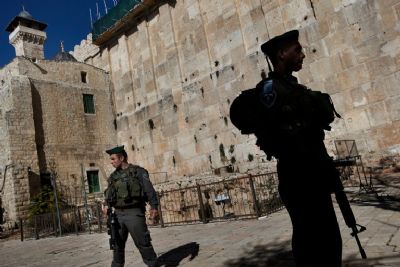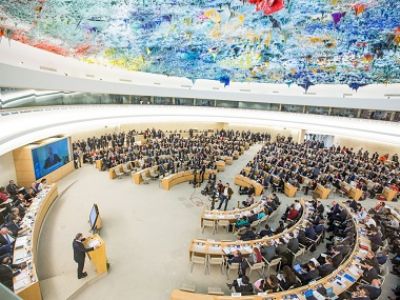Share
What's New
Resources updated Monday, November 27, 2017
November 27, 2017

"Israel made its case on Monday to countries that contribute troops to the UN Interim Force in Lebanon (UNIFIL), saying they have to do much more to both inspect for, and report on, Hezbollah arms violations in southern Lebanon.
Foreign Ministry deputy director-general for diplomacy Alon Ushpiz and deputy director-general for the United Nations and International Organizations Alon Bar briefed a number of ambassadors from states contributing to UNIFIL to voice Israel's expectations before a discussion on UNIFIL scheduled for the Security Council on Wednesday.
Israel's position is that while UNIFIL plays an important role, it needs to do more to implement UNSC Resolution 1701, by inspecting sites where there are suspicions that Hezbollah has stored weapons, and reporting to the UN on Hezbollah violations...
Israel does not expect UNIFIL to confront the terrorist organization militarily, but it wants there to be a better record of violations, one diplomatic official said. Jerusalem has complained in recent months that it has provided information to UNIFIL about Hezbollah establishing outposts along the border with Israel, but that these complaints were summarily dismissed without serious investigation or inspection.
Among the states contributing the most troops to UNIFIL are, in descending order: Indonesia, Italy, India, Spain, Ghana, Nepal, Malaysia, France, Finland and Ireland.
Neither Indonesia, with 1,288 soldiers in the force, nor Malaysia, with 829, have diplomatic relations with Israel. The force has some 10,700 military personnel from 41 countries...
According to Israeli officials, Israel's call for more reporting of Hezbollah violations of 1701 stems from the belief that both Hezbollah and its Iranian backers are sensitive to international opinion and do not want to have to deal with reports of violations.
Israeli officials acknowledged that Israel and the UN do not see eye to eye on the effectiveness of the UNIFIL force.
UN Secretary-General Antonio Guterres issued a report on Friday saying the UN was unable to confirm Israel's claims that the terrorist organization was arming itself in southern Lebanon, in violation of 1701.
He said that although there are regular allegations of arms transfers to Hezbollah, the UN 'is not in a position to substantiate them independently.'..."
Israel Lobbies UNIFIL Nations Against Hezbollah Arms Ahead of U.N. Debate Article

16-year-old Palestinian arrested at Cave of Patriarchs for hiding gun on his person Document

"Weeks ahead of the expected completion of a U.N. database of companies that operate in Israel's West Bank settlements, Israel and the Trump Administration are working feverishly to prevent its publication.
While Israel is usually quick to brush off U.N. criticism, officials say they are taking the so-called 'blacklist' seriously, fearing its publication could have devastating consequences by driving companies away, deterring others from coming and prompting investors to dump shares of Israeli firms. Dozens of major Israeli companies, as well as multinationals that do business in Israel, are expected to appear on the list.
'We will do everything we can to ensure that this list does not see the light of day,' Israel's U.N. ambassador, Danny Danon, told The Associated Press.
The U.N.'s top human rights body, the Human Rights Council, ordered the compilation of the database in March 2016, calling on U.N. rights chief Zeid Ra'ad al-Hussein to 'investigate the implications of the Israeli settlements on Palestinians.'...
Israel has long accused the United Nations, and particularly the rights council, of being biased against it.
Israel is the only country that faces an examination of its rights record at each of the council's three sessions each year. Some 70 resolutions, or about quarter of the council's country-specific resolutions, have been aimed at Israel. That is nearly triple the number for the second-place country: Syria, where hundreds of thousands have been killed in a devastating six-year civil war.
Israeli leaders and many non-governmental groups also complain that some of the world's worst violators of human rights, including Venezuela, Saudi Arabia, Congo and Cuba, sit on the council.
Some Western diplomats have said the database could set a harmful precedent by blurring the line between business and human rights on issues that are better left to trade policy than the Geneva council..."
Israel races to head off U.N. settlement 'blacklist' Article
